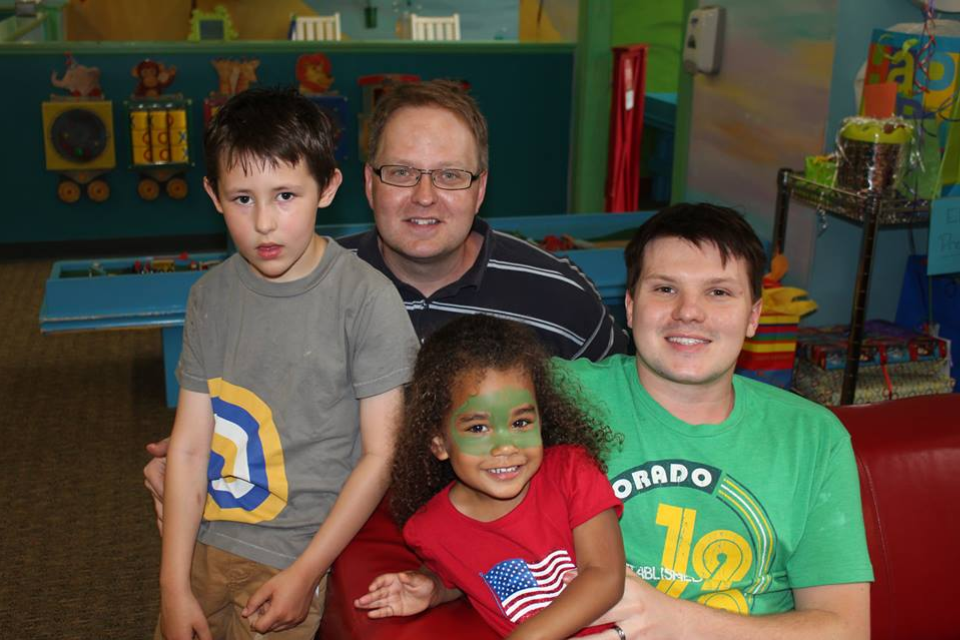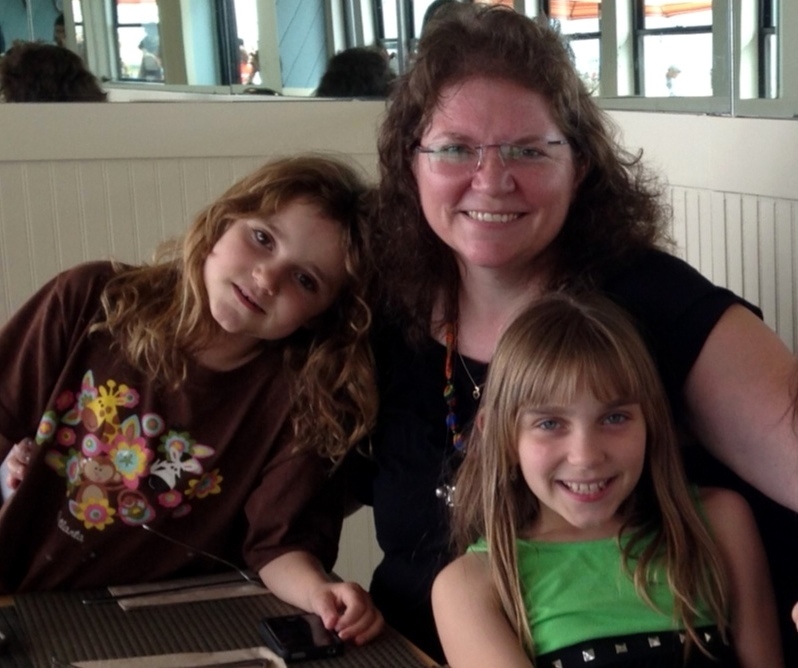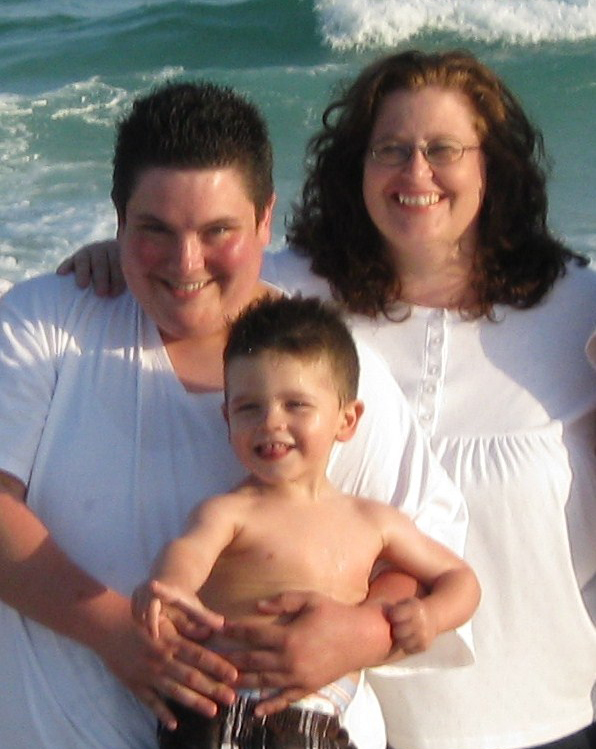LGBTQ Parenting Special Needs Children
What if Your Child had Autism? LBGT Parents Raising Children with Special Needs
By Beverly Prince-Sayward
When we become parents, we usually don’t think about the possibility that our child might have special needs. Yet according to the Centers for Disease Control and Prevention in 2012, it is currently estimated that 1 in 88 children in the U.S. have autism, and that is just one form of special needs we may encounter. So what does that mean as a parent? Would you know who to turn to or what to do if you thought your child might have a special need?
As a writer for Gay Parent magazine, I had the privilege of interviewing four LGBT families raising children on the autism spectrum. These are parents who are learning how to best meet the needs of their wonderfully unique children, while also taking care of themselves along the way.
Jim and Alex Langreder are the proud fathers of 7 year old Elliot, who has ASD (autism spectrum disorder) and 3 year old Arabelle. Elliot was the 4 week old baby boy Jim and Alex had been hoping for. He was a happy baby they loved to hold constantly: “We were just so excited to have a baby to call our own, so we never put him down.” At first, Jim and Alex thought that maybe Elliot was a little delayed in his development, but as they were already using the early intervention services provided by their state due to Elliot’s birth family history of cognitive delays, they didn’t really worry too much about it. Then when Elliot was 18 months old, Jim was given Jenny McCarthy’s book Louder than Words: A Mother’s Journey in Healing Autism and the connections became clear. With the advice of a good friend who also had a child with ASD and the supportive school district Elliot transitioned to at 3 years old, Jim and Alex started the path to getting him the official diagnosis of autism.

The Langreder family, left to right, Elliot, Jim, Arabelle, and Alex

Jennifer St. Jude with Rosie (left) and Madison
Jennifer St. Jude is the proud mother of a grown son and step-daughter, as well as 9 year old Madison and 7 year old Rosie, who are both on the autism spectrum. Jennifer and her partner decided to have children via artificial insemination for both Madison and Rosie. According to Jennifer, her mother’s instincts that something was just not typical with Madison started almost immediately. “She screamed constantly for the first 8 months of her life, no joke. My friends’ babies were not like this. Comments of ‘What’s wrong with her?’ ‘Did the donor do drugs?’ and ‘You should try this or that’ became overwhelmingly painful.” It took 5 1/2 years of worry and Jennifer being her advocate to get Madison finally diagnosed with autism, and her younger sister Rosie was diagnosed soon after.
Suzanne Stepp and Kate Theune are proud mothers of 12 year old Martin and 9 year old Oliver, both boys are on the autism spectrum. They are also parents to 6 year old Joseph, 3 year old Michael and three foster children. Martin and Oliver are Suzanne’s biological children from a previous relationship and Kate became a part of their family when the boys were 9 and 6 years old, after their diagnoses of autism. Suzanne is a special education teacher so when her oldest son Martin at 2 years of age started having some of the more common symptoms of autism such as repetitive movements and loss of speech, she went to seek the advice of her fellow teacher who had twin sons with autism. Her younger son did not have the same stereotypical signs, but he did have delayed speech and emotional instability which prompted her to have him tested as well when he was 3 years old.

Suzanne Stepp, Kate Theune holding Michael, Joseph (with Santa), Oliver, and Martin

Ginger (right) and Laurie Kline and son River
Ginger and Laurie Kline are proud co-mothers of their 3 year old son River as well as three grown daughters. Ginger and Laurie had raised Laurie’s three daughters from a previous relationship when they decided to have River. At 11 months old, River had his first seizure (he has epilepsy as well as autism) and soon after they realized he was not retaining what he learned and also lost interest in human contact. At River’s 2 year old well-child checkup, they brought up their concerns with their pediatrician who referred them to their state’s early intervention program where he was eventually diagnosed and started on his long journey with therapies and interventions.
As I interviewed these families, many common themes kept coming up. First, they all agreed that early intervention was ideal and they wanted to sincerely prompt other parents who have any concerns to seek out assistance and get a diagnosis as soon as possible. Go to your pediatrician, your state’s early intervention program, your school district, your local children’s hospital, a psychiatrist, and they all insisted “Get into a support group with seasoned parents that can help you navigate all the crazy verbiage that is autism and the system you have to navigate,” says Suzanne Stepp.
Another theme that kept repeating itself was to make sure you find the resources to take care of yourselves and your co-parenting partners. As Ginger Kline says, “When raising a special needs child your life is put on hold, everything comes to a stop. You live day to day with your world revolving around your child. It is not a bad thing, I just wish we would have had someone to talk to us about what we were going through.” Jennifer St. Jude repeated these sentiments, “Having two small children with autism was stressful and unfortunately, my partner and I didn’t realize how much we needed support as well until it was too late for us. Autism doesn’t destroy relationships, but it does expose weaknesses that are already there.” Suzanne Stepp explains, “I was adamant about doing as much for myself as I could because I was trained to deal with children with special needs. This is something I regret as I went to bed exhausted and in need of help I was too proud to ask for.” Additionally, all the parents felt their sexual orientation was a non-issue; having a child with special needs trumped any problems people had with them being gay.
Through it all, every one of these parents have found what to do to help them get through their days celebrating each and every moment. They have worked with specialists to implement programs and methods to best support their children. “I don’t know what Elliot’s future holds, but I see a kid who is intrigued and curious about the world around him and wants to take it all in. We always celebrate the smallest steps and just hope for the best. The first time he actually acknowledged that I came home and said, ‘Hi Daddy,’ was the most amazing feeling,” says Jim Langreder.
When asked about a particular interest or hobby of their children, they all wanted to say so much more, but narrowed them down to the following: “Elliot (7) LOVES cars! He knows the [model] names of everyone’s car. He has also always loved music and rhythm, and he started horse therapy; the excitement on his face is priceless when you see the horse approaching him,” says Jim Langreder. “Both of my girls (9 and 7) love art, music, and acting. They are also very technical; I never got a chance to teach them the iPad I had in my room but they figured it out and were using it better than me!” says Jennifer St. Jude. “Martin (12) is an electronics geek. He is excellent at math and enjoys playing chess. While Oliver (9) loves sports, he also plays Yugio and Pokemon and is like an encyclopedia when it comes to characters, sports teams, and history,” says Suzanne Stepp. Lastly, Ginger Kline says, “River (3) is very much into pirates right now. He enjoys playing swords and dressing up with pirate gear. He also loves to hold hands! He will gladly give hugs and kisses and smiles at familiar people.”
For more information about autism, please visit Autism Speaks at www.autismspeaks.org.
This article was first published in Gay Parent Magazine’s September-October 2013 issue #90. Order a single issue or subscribe.

